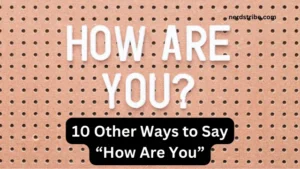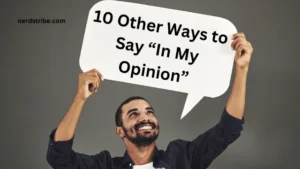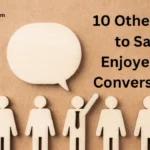Everyday conversations are filled with moments of curiosity, where you need to understand the reason behind something. Often, the phrase “How come?” is our go-to for asking questions.
It’s simple and conversational, but sometimes it can sound too informal, repetitive, or not quite suited to the tone of the discussion. That’s where knowing alternative expressions can make a difference.
The way we ask questions shapes the flow of our conversations. By diversifying your phrases, you can create more engaging, thoughtful, and appropriate dialogues for both casual and professional settings.
Whether you’re discussing decisions at work, chatting with friends, or simply exploring an idea, having more tools in your linguistic toolbox helps.
This post explores 10 smart alternatives to “How come?” to elevate your conversations. From formal options to friendly phrases, you’ll find expressions that fit any context and allow you to seek explanations with style and precision. Let’s dive in!

Contents
- 1 1. “Why is that?”
- 2 2. “What is the reason for that?”
- 3 3. “Can you explain why…?”
- 4 4. “Could you elaborate on that?”
- 5 5. “What is the rationale behind that?”
- 6 6. “I’m curious to know why…”
- 7 7. “What are the reasons for…?”
- 8 8. “Could you shed some light on…?”
- 9 9. “I’m trying to understand why…”
- 10 10. “What led you to that conclusion?”
- 11 Conclusion
- 12 FAQs
- 12.1 Why is it important to use alternatives to “How come?”
- 12.2 Are these phrases suitable for formal settings?
- 12.3 Which alternative is best for casual settings?
- 12.4 Can these phrases be used in writing?
- 12.5 Are any of these expressions region-specific?
- 12.6 How can I ensure my tone doesn’t sound confrontational?
1. “Why is that?”
- Example: “Why is that you didn’t attend the meeting?”
- Key Points: A straightforward alternative for casual or formal settings. This phrase conveys curiosity without being overly formal or casual.
2. “What is the reason for that?”
- Example: “What is the reason for that delay?”
- Key Points: A formal way to inquire about the reasoning, often used in professional discussions or written communication.
3. “Can you explain why…?”
- Example: “Can you explain why the plan changed?”
- Key Points: Polite and clear, this phrase emphasizes respect and makes the question feel intentional.
4. “Could you elaborate on that?”
- Example: “Could you elaborate on why this approach was chosen?”
- Key Points: Best for deeper discussions where detailed explanations are required.
5. “What is the rationale behind that?”
- Example: “What is the rationale behind the policy update?”
- Key Points: Suitable for professional or academic settings, focusing on logic and reasoning.

6. “I’m curious to know why…”
- Example: “I’m curious to know why you picked that destination.”
- Key Points: This adds a personal and engaging tone, emphasizing genuine interest.
7. “What are the reasons for…?”
- Example: “What are the reasons for this decision?”
- Key Points: Encourages a comprehensive response and is great for multi-faceted issues.
8. “Could you shed some light on…?”
- Example: “Could you shed some light on the changes to the schedule?”
- Key Points: This figurative expression is ideal for conversational or formal inquiries needing more clarity.
9. “I’m trying to understand why…”
- Example: “I’m trying to understand why the report was delayed.”
- Key Points: Adds a direct and honest tone, highlighting your effort to comprehend.
10. “What led you to that conclusion?”
- Example: “What led you to that conclusion about the project timeline?”
- Key Points: This is excellent for understanding thought processes or decisions in a thoughtful way.
Conclusion
Using alternatives to “How come?” enhances your ability to ask questions effectively and thoughtfully. Whether you’re having a casual conversation or a professional dialogue, diverse expressions enrich your communication and foster deeper engagement.
These phrases allow you to convey curiosity with the right tone for every situation. By integrating these alternatives into your language, you’ll not only improve your conversational skills but also leave a better impression on your audience.
Experiment with these expressions, and notice how they transform your interactions, making them more polished and insightful.
FAQs
Why is it important to use alternatives to “How come?”
Using alternatives ensures your communication fits the tone and context, making conversations more meaningful and engaging.
Are these phrases suitable for formal settings?
Yes! Phrases like “What is the rationale behind that?” or “Could you elaborate?” work well in professional and formal discussions.
Which alternative is best for casual settings?
“Why is that?” and “I’m curious to know why…” are casual yet respectful options for friendly conversations.
Can these phrases be used in writing?
Absolutely. Options like “Can you explain why?” and “What are the reasons for…?” are ideal for written communication.
Are any of these expressions region-specific?
No, most of these phrases are widely understood in English-speaking regions and suitable for diverse contexts.
How can I ensure my tone doesn’t sound confrontational?
Use polite expressions like “Could you shed some light on…” or “I’m trying to understand why…” to keep the tone inquisitive and respectful.








